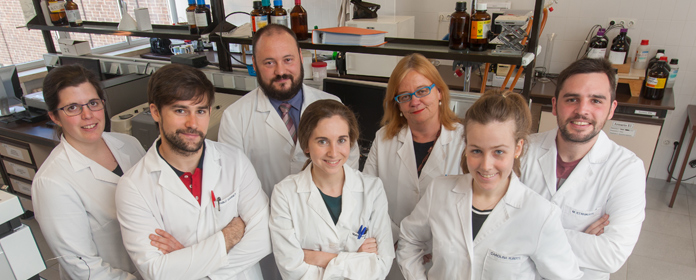Daniel Plano synthesizes an antitumor molecule that is already marketed in the USA.
A laboratory sells the compound from the University's researcher at €1,000 per 50 mg unit.

PHOTO: Manuel Castells
Daniel Plano, PhD in Chemistry and researcher of the department of Chemistry Organic and Pharmaceutical Sciences of the University of Navarra, has managed to get a compound with in vitro antitumor activity marketed in the U.S. The substance, which the researcher native of Sangüesa synthesized during his postdoctoral stay at Penn State College of Medicine (USA), is distributed by laboratory Cayman Chemical.
With a price of 1,000 euros per unit of 50 milligrams, this substance is a derivative of aspirin with selenium and represents one of the few selenium compounds that exist in the market for use in research in cancer and other diseases. "In fact", says the scientist from Sangüesa, "the laboratory, located in the state of Michigan, specializes in biomedicine and supplies kits for essay against cancer, cardiovascular problems, epigenetics, etc., to universities and centers at research", hence the importance of getting them to market the product.
Currently, Daniel Plano is part of different projects at research at the School of Pharmacy and Nutrition and at the high school of Tropical Health of the University of Navarra, in which he is developing new molecules to treat leishmania and different types of tumors: "What we do is prepare compounds with selenium in their structure that we test against cancer, leishmania, Chagas, atherosclerosis and metabolic and cognitive disorders", explains the scientist.
partnership international and new patentsMost of the time, these research projects are carried out at partnership with other national and international centers. In fact, the researcher of the School of Pharmacy and Nutrition is going to return to the USA, to Dr. Sharma's laboratory , for a six-month stay to continue developing new selenium compounds against cancer: "Specifically, I will work on two projects that started during my postdoctoral stage. One of them is a chemoprevention study in lung cancer and the other is a selenium derivative at development preclinical, recently protected by an international patent. This patent has been selected in a very competitive call in the state of Pennsylvania, and from it we are going to create a business exclusively oriented to transfer it to clinical use", adds the Navarrese researcher .
Although the results obtained to date are preliminary - they are performed in cells and in mouse models - the professor stresses that they are still "very promising": "They may represent a great step forward towards better treatments for pancreatic cancer, which is the tumor with the highest mortality rate, and for which there is no effective treatment available". Likewise, some selenated compounds have shown efficacy against prostate cancer and colorectal tumors. "In the latter case, we have observed up to a 70% reduction in tumor size in mice," he concludes.
